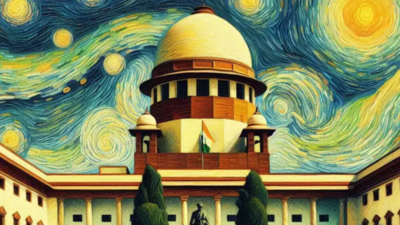NEW DELHI: A day before the Supreme Court hearing on a batch of petitions challenging the
validity of Places of Worship Act
, citizens from various walks of life, including noted academicians, historians, former IAS and IPS officers, MPs and political parties have filed applications in support of the law, saying it was intended to safeguard secularism and to ensure communal harmony.
They told the court that the petition seeking scrapping of the law was based on complete ignorance of history and glossed over the fact that Hindu kings too demolished Hindu temples, Buddhist shrines and Jain temples of conquered territories and installed their own structures in their place.
Countering submission that many religious structures were taken over and converted to mosques when Mughals invaded the country, some of the applicants said even if it was assumed that certain mosques were constructed after demolishing Hindu temples by invaders, then such claims could have no end, as many Hindu temples were erected on ruins of Buddhist stupas and Buddhists could claim a right to restore such temples to stupas. They said the Act was brought to put an end to the controversy and to maintain peace and communal harmony.
Some of the prominent people who approached SC separately or in groups included former Punjab DGP Julio Ribeiro, former chief information commissioner Wajahat Habibullah, former Delhi LG Najeeb Jung, former chief election commissioner S Y Quraishi, Lt Gen Zamiruddin Shah (retired), former home secretary Gopal Krishna Pillai, noted historians Romila Thapar and Mridula Mukherjee, and MPs Manoj Jha of RJD and Thol Thirumavalavan of VCK. The common theme in their pleas was that the 1991 Act was meant to preserve India’s social fabric and foster communal harmony and opposed reopening of settled issues concerning religious sites.
Applications have also been filed in support of the petitioners to scrap the Act. Delhi-based NGO
Hindu Shree Foundation
, which claims to represent interests and rights of Hindu devotees both domestically and internationally, said the Act was arbitrary and there was no justification to fix a cut-off date of Aug 15, 1947. It said there was no rational nexus between political independence and creation of Republic of India and settling the civilisational conflict emanating from colonial erasure of Hindu identity and an imposition of cultural hegemony by Islamic invaders.
Former MP Chintamani Malviya, too, filed an application alleging that the law itself was violative of secularism and should be done away with. “The Act is void and unconstitutional for many reasons. It offends rights of Hindus, Jains, Buddhists and Sikhs to pray, profess, practice and propagate religion. It deprives them from owning religious properties belonging to deity misappropriated by other communities. It takes away their right of judicial remedy. Centre has transgressed its legislative power by barring remedy of judicial review which is a basic feature of the Constitution. SC, in a catena of decisions, held that right to judicial remedy cannot be taken away by the state,” he said.
A joint plea filed by Ribeiro, Habibullah, ex-IFS officer Deb Mukharji and ex-IAS officer Kamal Kant Jaswal said the questions raised in this case by the petitioners stemmed from a “strong majoritarian and anti-minorities bias” which is an anathema to the Constitution.
“The petition shows a complete ignorance of history, since it glosses over the fact that rulers demolished places of worship of subjugated dynasties and kingdoms across Indian history and across religious sects. Critical historical scholarship shows that in the pre-Islam era, several situations of religious conflict existed between Buddhist, Jain, and Hindu sects,” they said.
The joint application filed by Jung, Quraishi, Pillai and others said, “This country has been the cradle of not only one of the oldest human civilisations but several religions and religious denominations. It is also a matter of record that there have been struggles for supremacy and propagation of religion throughout the history of this nation. In the above circumstances, the Act was enacted with the avowed objective of not letting past acts/omissions on the part of one religious group or the other, destroy the destiny of future generations and, hence, the Act is pivotal for maintaining communal harmony and preventing conflicts that may arise from disputes having historical trappings.”


